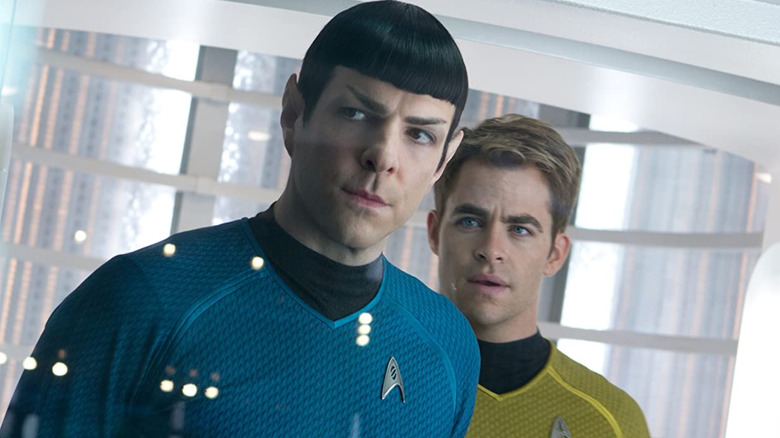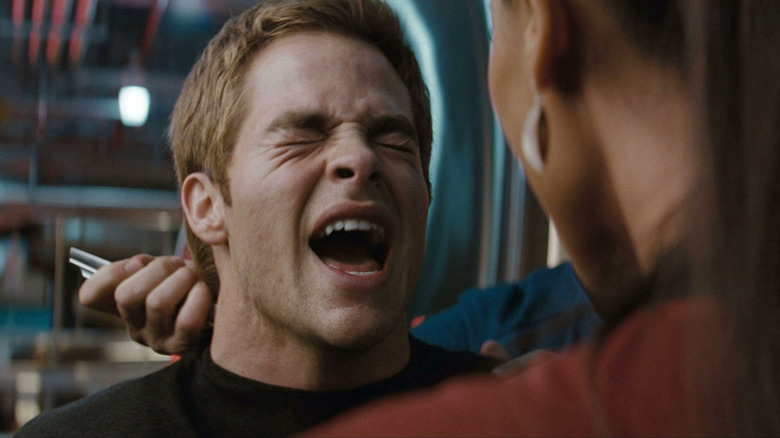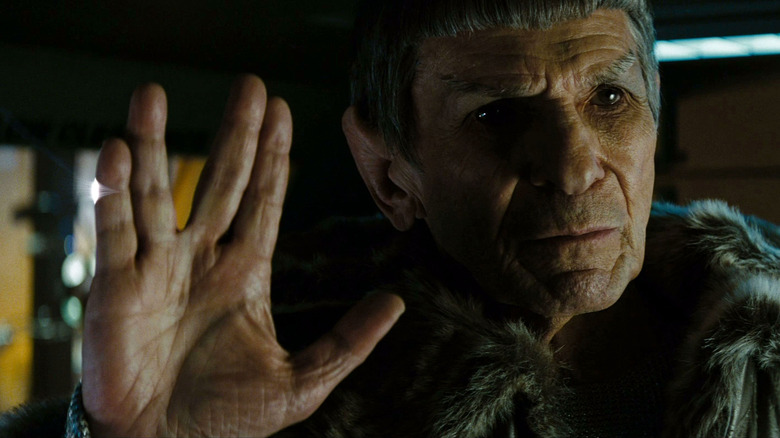Why J.J. Abrams Once Called Star Trek 'Silly'
In 2005, "Star Trek" was effectively dead. The most recent series, "Star Trek: Enterprise," was canceled after four inauspicious seasons, falling three years shy of "Star Trek: The Next Generation," "Star Trek: Deep Space Nine," and "Star Trek: Voyager." The series wasn't ever as widely beloved as those shows, emerging as the block sheep of the franchise. Also, the 2002 film "Star Trek: Nemesis" was the lowest-grossing "Star Trek" film to date, drawing the adventures of the "Next Generation" characters to an equally inauspicious close. It seemed that the bleak, war-riddled post-9/11 world was no longer in the mood for a sci-fi series that preached pacifism and diplomacy.
But then, "Star Trek" came roaring back in 2009 with a rebooted feature film directed by J.J. Abrams. The new film, just called "Star Trek," returned to the original Starship Enterprise, and followed the familiar characters of Kirk, Spock, McCoy, etc., but now played by newer, younger, sexier actors. Abrams also ratcheted up the action, turning the ordinarily philosophical series into a straightforward shoot-'em-up. The film was packed with super-slick Hollywood action violence, and audiences loved it. On a budget of $150 million, "Star Trek" made over $387 million worldwide. /Film loved it.
Of course, some old-school stick-in-the-mud Trekkies — and I am one of them — understood that Abrams' film was very far from the egalitarian spirit of the franchise. Old "Star Trek" typically focused on workplace relationships, sci-fi concepts, and ethical dilemmas. The new "Star Trek" didn't have any of those things, preferring to be a more predictable, revenge-based, high-octane thriller. And then, imagine Trekkies' outrage when Abrams, only days before the film was released, declared to the Guardian that he never got "Star Trek." He had always been more of a "Star Wars" fan, connecting with action and thrills over cold logic and scientific thinking.
J.J. Abrams likes Star Wars more than Star Trek
It should be remembered that "Star Trek," while seeing its share of phaser battles and hand-to-hand combat, wasn't ever predicated on action. Series creator Gene Roddenberry envisioned a post-war, post-religious, post-capitalist future wherein all humans had put their differences aside and worked together for — and devoted all their technologies and talents to — the common good of the galaxy. The triumphs of "Star Trek" came when war was avoided, not when an enemy was bested.
Abrams, however, didn't like that. In his talk with The Guardian, he complained that "Star Trek" was too talky and didn't have the kind of wild adventures that he seemingly preferred. In his words:
"['Star Trek'] always felt like a silly, campy thing. I remember appreciating it, but feeling like I didn't get it. I felt it didn't give me a way in. There was a captain, there was this first officer, they were talking a lot about adventures and not having them as much as I would've liked. Maybe I wasn't smart enough, maybe I wasn't old enough. But 'The Twilight Zone' I was obsessed with. Loved it."
To be fair, "Star Trek" did indeed have its share of silly, campy moments. The episode "Spock's Brain" comes to mind, or perhaps "The Way to Eden," which featured a hippie-led musical ensemble. Also, Roddenberry may have been very progressive in some respects, but he also was careful to write in some of his own personal sexual fantasies into the series (the women all wear miniskirts, for instance), making for numerous dated, sexist conceits. "Star Trek" came out in 1966, and it's certainly a product of its time.
But it was galling for Trekkies to hear that Abrams not only didn't like "Star Trek," but didn't even bother to get to know it.
Abrams didn't do his homework
Abrams was able to snake around multiple decades of extant "Star Trek" lore via a somewhat-clever parallel universe conceit. Thanks to a time portal, a super-advanced Romulan ship traveled back in time to the moment that James T. Kirk was born, killing his father and altering the timeline. Abrams' posited that Kirk would grow up to look like Chris Pine, and that he and his fellow Enterprise crewmates would be more emotional versions of themselves. In a fatalistic twist, the characters would wind up serving together on the U.S.S. Enterprise, now a much larger ship. Abrams didn't concern himself with what came before, though. He leaned into his ignorance of "Star Trek," and churned out the movie he wanted. He said:
"I had no idea there had been 10 movies! I still haven't seen them all. I didn't want to become a student of 'Star Trek.' I felt that was actually one of the few advantages I had. I was trying to make a movie, not trying to make a 'Trek' movie."
Abrams also directed the "Star Trek" sequel "Star Trek Into Darkness" in 2013, and he only strayed further from the core intellectualism of the original series. He once again delivered a high-octane, revenge-based actioner, and made even more money, netting over $467 million worldwide. That film, however, is now considered to be one of the worst in the series. Abrams stepped away for the 2016 follow-up "Star Trek Beyond."
Abrams had a different attitude to his 2015 film, "Star Wars: The Force Awakens." He grew up watching "Star Wars," and always loved it, saying that it always left an impression on him. He felt the world was crowded and rich and full of possibilities, emotions, and dreams.
He never said anything like that about "Star Trek."


